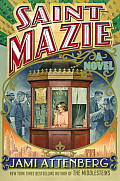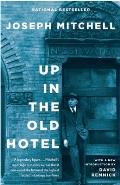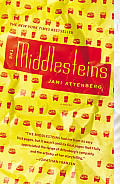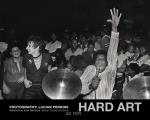Original Essays
by Jami Attenberg, June 3, 2015 2:17 PM
 Previous to Saint Mazie, I've only ever written about characters I've made up from scratch before. Then I read an essay by Joseph Mitchell in his wonderful collection Up in the Old Hotel, and I became entranced by the idea of writing about a real person: Mazie Phillips, aka The Queen of the Bowery. She ran a movie theater on the Lower East Side for decades and was the heart of her community, befriending eccentrics, children, and all the bums on Skid Row. She was a real knockout of a human being, and I couldn't stop thinking about her. But she died in 1964, seven years before I was born. I would never know her, and it would be difficult for me to find someone still alive who had known her. I had a finite amount of information: the original essay, an obituary, and another article written when she retired. How could I write accurately about a person I had never met? What kind of responsibility did I have to her personal truth? How does one fictionalize a real person and still make it a "true" story? First, I had an idea of her truth as it pertained to her spirit, which I found to be bawdy, broad, generous, and ravenous. She was someone who helped thousands of homeless men for decades purely because she cared about them and was concerned about their health and happiness. In sum, she had a big heart. And when I read the original Mitchell essay about her, I felt like I understood her essence instantly, and that's a tribute to the way Mitchell writes — his ear for the way people talk, the way he gathers and builds details, how he channels their personal rhythms. Here Mitchell describes her in the original essay: Sitting majestically in her cage like a raffish queen, Mazie is one of the few pleasant sights of the Bowery. She is a short, bosomy woman in her middle forties. Some people believe she has a blurry resemblance to Mae West. Her hair is the color of sulphur. Her face is dead white, and she wears a smudge of rouge the size of a silver dollar on each cheek. Her eyes are sleepy and droopy-lidded. On duty, she often wears a green celluloid eyeshade. She always has a cigarette hanging from a corner of her mouth, and this makes her look haughty.  But even as Mitchell explained her essence, he also set up these little mysteries and intrigues about her in the essay. Once I decided to write it, I looked at those mysteries and decided which ones were the big ideas. Like I was fascinated with how a Jewish woman on the Lower East Side in the 1920s became interested in the Catholic faith to the point where she started going to mass on a regular basis. And I wondered why she mainly helped homeless men and not homeless women. And why did she never marry? But also I was interested in flaws, her drinking and her violent tendencies. I was revving up to make that fictional leap. But even as Mitchell explained her essence, he also set up these little mysteries and intrigues about her in the essay. Once I decided to write it, I looked at those mysteries and decided which ones were the big ideas. Like I was fascinated with how a Jewish woman on the Lower East Side in the 1920s became interested in the Catholic faith to the point where she started going to mass on a regular basis. And I wondered why she mainly helped homeless men and not homeless women. And why did she never marry? But also I was interested in flaws, her drinking and her violent tendencies. I was revving up to make that fictional leap.
Then I did actual good old-fashioned research. I visited the Tenement Museum in New York City, where I was able to view cramped tenement apartments from Mazie's era. And I read books, including Amusing the Million: Coney Island at the Turn of the Century, which is a history of Coney Island; Only Yesterday, a history of the 1920s written in the 1930s; and Low Life, a history of New York City through the 1800s and early 1900s. I watched documentaries, I listened to music. I jammed my head with information until I arrived where I had enough research to make that leap. And finally I did the more ethereal, indefinable kind of work: I daydreamed about her. I walked around Manhattan, the streets she walked herself, especially on cobblestone streets, and under the night sky, streets I imagined she had walked on herself. I meditated on her. I probably put a little bit of myself in her, and a few other strong women I know, because that's inevitable, that kind of thievery. She's a mixture of a lot of things, but she's her own person too. She became that person — her own person, her own character — after two years of contemplation, writing, and revision. Still I wonder sometimes if I did her justice. Did I do due diligence to this real-life person? Did I pay the right respect to her? I can only hope that I did my job correctly — and that people will fall in love with her as I
|
Guests
by Jami Attenberg, June 20, 2013 10:00 AM
 I don't have much time to write today, but I wanted to tell you about this really great moment from last night. I went to WORD Brooklyn, my favorite bookstore in the entire world, for an event sponsored by the Vol 1. Brooklyn collective: a discussion of Hard Art, DC 1979, which details the rise of the punk scene in DC. That would have been enough of a social occasion, just hearing those stories about these cool local kids creating what looked to be quite a joyous movement out of air. While the authors of the book spoke, pictures of kids hanging out at Bad Brains shows played on a screen in the background. As the pictures scrolled I made up little stories about all of these people from 1979 in my head. Near the end, one of the authors talked about the influence of former DC mayor Marion Barry on this music scene, a thing I did not know, which means I learned something new last night. So really, that is a pretty full evening for me, and I probably could have just gone straight home to bed. But then I ran into some friends who were at the reading, and we decided to get a little nip of something, because it's really gorgeous here right now in New York, like it feels as if we're having a true summer at last, and those are the nights you should go out for a drink. The last few years it went from chilly, rainy spring to gross, sweaty, humid weather in a few weeks, but it feels like summer is really taking its time this year. Yesterday the morning was cool, the afternoon was hot and sunny, and the night was just perfect. There was a little breeze, and it was divine.  Anyway, we went to have a drink at a bar a few blocks away from the bookstore, and we sat outside on the corner of Greenpoint Ave. All of my friends were drinking little whiskies on the rocks. A man walked by with a dachshund puppy in his arms, and I made him stop so my friend and I could pet it. We talked about the 1985 Chicago Bears for a while. Everyone was in a good mood. Anyway, we went to have a drink at a bar a few blocks away from the bookstore, and we sat outside on the corner of Greenpoint Ave. All of my friends were drinking little whiskies on the rocks. A man walked by with a dachshund puppy in his arms, and I made him stop so my friend and I could pet it. We talked about the 1985 Chicago Bears for a while. Everyone was in a good mood.
And then, one of my friends pulled a book out of her bag so we could see what she was reading. It was thick and impressive. Then we all started pulling our books out of our bags. Talking about our books. Showing off a bit. One person had two books, because one is not enough. Maybe one book is for the subway, but the other one is for the café. Who knows? We do not have to have a reason to have more than one book in our bags. And I thought: Oh book people, how I love you so. You and your bags filled with books. Really, my heart seized with love for these people. It could have been anything we pulled out of our bags to brag about. But it was books. Note: Please join Jami Attenberg at Powell's City of Books on Wednesday, June 26, for an in-store reception at 6:30 p.m. followed by a reading at 7:30 p.m.
More from Jami Attenberg at PowellsBooks.Blog:
|
Guests
by Jami Attenberg, June 19, 2013 10:01 AM
 Last night I did a reading for students at NYU with Lydia Davis and Chad Harbach, two great, literary writers, but also two very funny writers. (I promise you the crowd was really entertained by both of their readings, and I was extremely glad to be the opening act. You do NOT want to follow Lydia Davis.) During the Q&A we were asked several times about being funny. How do you impart humor in your writing? How do you know when something is funny? I always think life is funny enough without even having to try very hard. I've heard from some people that they think my most recent book, The Middlesteins, is funny, but I've heard from plenty of others that it's extremely sad. It's both, I guess. Last night I said I was a "laugh through the tears" kind of person, which probably describes the essence of my writing too. (Although, sadly, I am also a "laugh when it is totally inappropriate to laugh" person, as well.) One young woman said that she thought she was writing something that was funny, but then when she showed it to some people, they didn't think it was. I told her she should only ever hang out with people who think you're funny, and she should stop being friends with them immediately. But really the point is this: When you are just starting out, you should be writing to entertain yourself. There should be a sense of joy to your work, and a sense of exploration. There's plenty of time to worry about what everyone else thinks. Like basically you have an entire lifetime of people being up your ass about everything; might as well make yourself laugh along the way. Another young woman later told me she thought she was writing serious things, but then it turned out everyone thought it was funny. It didn't seem to bother her, though. I suspected immediately she was probably just an exceptionally keen observer. She whispered to me something about most people sucking and I thought she would do just fine as a writer. It's good to think people suck for a while. That's sort of how we all get started. Often we write to rail against the world; we write to process our darkest (but also sometimes best) experiences. Or we write because people are sometimes terrible and we need to figure out why they are terrible and also maybe how to like them regardless of their behavior. Although eventually, you'll realize not everyone sucks. You only have to find one character worth liking (or at least find intriguing!) in your writing to make a book worth reading — and writing. Note: Please join Jami Attenberg at Powell's City of Books on Wednesday, June 26, for an in-store reception at 6:30 p.m. followed by a reading at 7:30 p.m.
More from Jami Attenberg at PowellsBooks.Blog:
|
Guests
by Jami Attenberg, June 18, 2013 10:00 AM
 Well, I know you were all worried from yesterday's blog post: my car passed inspection. Of course, does a car really "pass" inspection if it involves hundreds and hundreds of dollars in repairs? I feel like this car kind of slid by yesterday, as if its daddy bought its way into Harvard. I can't quite seem to quit this car, even if a few of its parts are actually taped together. No big deal; it's just the stereo face, which kept popping out until I stashed a roll of masking tape in the car, which I ritually apply and remove every time I have a long trip. I make lots of jokes about how the massive dent on the rear left side of the car, acquired when a big rig rammed into me as we simultaneously climbed an expressway entrance, makes me fit into my Brooklyn neighborhood. "No one will ever want to steal my car," I say, like I'm a genius and I planned it all along. Though sometimes I think someone might set it on fire, just to put it out of its ugly old misery. But this is my tour car! I've driven it on six tours, all over the country, to all the beautiful bookstores across the land, plus on trips to far-off cities where I've spent time on extended writing breaks. Portland; Los Angeles; Seattle; New Orleans; Marquette, NE; and points in between. I have seen America, and I am here to report it is beautiful. Once, I was on tour driving through Wyoming during a snowstorm past jackknifed trucks, and I pulled into Laramie for the night in fear. The next morning, as I exited town, I saw a trail for miles of abandoned cars. My mind wrote a hundred post-apocalyptic novels that morning. Two days later I drove through another snowstorm on Donner Pass, and my mind wrote a hundred other kinds of novels, some involving the consumption of my juicy flesh. Once, on my way home from a writing break in Seattle, broke as a joke, I opted to sleep in the back of the car in a park along the Colorado River rather than check into a hotel. There I met an ancient street preacher, and his wife and seven children. He read me poems about Colin Powell while his wife silently nodded at every word. His children, homeschooled in their RV, were gorgeous, smiling, and innocent, and they clung to me from the minute we met. He would have read me poems all night had I let him, but they were nonsense, of course, and frequently predicted the end of the world. I slept — barely — locked in my car until the sun rose, and when I left, the preacher's wife and her children were suddenly standing there, on the edge of the parking lot wistfully watching me drive away and waving. There wouldn't have been enough room in the wagon to have taken them all with me. Once, I saw a beautiful sunset over the horizon and I felt very free and young and like everything was going to be OK in the end, if I could just keep going a little bit further. Once, I had car trouble. Oh wait, that was more than once. New Mexico is my favorite state to drive through, but there are parts of Utah and Wyoming too that blow my mind, not to mention parts of West Texas that felt more familiar than they should have — like once, a long time ago, in another life, I was a cowgirl, even though that seems impossible. I have been this neurotic for eternity, and everyone knows cowgirls aren't neurotic. They're just awesome. I never got a speeding ticket. Because I'm a law-abiding citizen. Did I mention I have the front fender taped together too? After 200,000 miles, that's what happens. Drive it into the ground, everyone tells me. But I think they might have to bury me in it. Next year, though. I've bought myself one more good year with this car. What will I do when I have to say goodbye? Note: Please join Jami Attenberg at Powell's City of Books on Wednesday, June 26, for an in-store reception at 6:30 p.m. followed by a reading at 7:30 p.m.
More from Jami Attenberg at PowellsBooks.Blog:
|
Guests
by Jami Attenberg, June 17, 2013 10:13 AM
 Lately my life has been a lot of travel, on planes, trains, and in a station wagon that is so beat up I am pretty sure it's not going to pass inspection today. (I'll let you know if it passes tomorrow. Please send your best thoughts to a 1993 Honda Accord station wagon.) And because my life has gotten sort of repetitive, I hope you'll forgive me if I asked for a little help with this first blog post. I asked people via my tumblr to send me their questions about being a writer. If you've got any yourself, please send me an email, and I'll try to answer them another day this week. I'm for the first time really encountering the tension in sharing process updates with writer-friends. Excited updates/commiseration/feedback-seeking versus quiet head-down work. I'm surprising myself by being drawn to the latter. I wonder if it's not competition but rather needing to remove myself from the insecurity/reassurance cycle that the process-sharing can turn into. The other day I was talking to a friend who had been offered a writer's residency out of the blue, and he was going to reject it for a number of reasons, but the one that he joked about was this: "My worst nightmare is, at the end of the day, having to listen to a group of writers talk about all the work they had finished that day." We writers are a whiny lot. And not everyone likes to listen. So look, no one can make you share your work if you don't want to. I share bits and pieces of my work pretty regularly — I am notorious for dropping a paragraph of the day into a Gchat window — and I also have someone who reads my work on a daily basis, which is a great luxury to have. But I also have friends who will write for years and years, entire drafts of books, that they won't show to anyone at all, and if you ask them how they're doing, they'll just say vaguely that they're working. So everyone's got a different strategy. If you're in some sort of group setting, like an MFA program or a writer's group, it's inherent to the process. And it's certainly helpful to go through something like that, where people force you to be held accountable for your work. That's training for the future, in a way, when you'll have to deal with editors and critics. (Although it will never quite prepare you for people who anonymously review your work on the Internet.) But it sounds like you're ready to move on from that. I don't think you even need to explain why you're doing it. However you feel is correct. It's your work and no one else's. It sounds like you're just trimming the fat and graduating to the next step in your life. I fully support eliminating the noise. I'd love to know what your planning process is like as a novelist. Do you have an idea and just start writing? Do you make some kind of guide or map or outline before you get into it? How much "writing in" to the novel do you do? Meaning, do you leave a lot of pages on the editing room floor? There's no real science to the writing process, nor are there any shortcuts. Process is a personal, intimate thing. So while I am not an outliner, I know creating one helps a lot of people tremendously. They appreciate the control it gives them. I'm a little too day-dreamy for an outline. I tend to get an idea and sit on it for a while, maybe six months or so, before I sit down and actually start writing. For me, the thinking part of writing is just as important as the writing part of writing. And then I start to hold the world a little bit in my head before I even get to the page. I suppose, in a sense, it's an outline of sorts — just an unwritten one. But it feels more amorphous. The details are unimportant that early on. I often describe it as having a sort of pregnant feeling. And then as I begin to write, I start to get a few flashes of emotional moments I want to discuss in the future, and I'll keep a running tally of those so that I don't forget them, which is also kind of an outline. But I don't ever sit down at the beginning of a book and plot it all out. I've got this fear if I know everything that is going to happen straight away, so will the reader, and that won't be fun for anyone. As for editing, I tend to write things in a fairly pristine and minimal fashion. If anything, I'll need to add things in during my second draft rather than take anything out. I do have a great editor who will tell me when things aren't working, so once I get to that stage, I start to cut things. But I am an under-writer rather than an over-writer, so more often there is the suggestion that I should tease things out more. I recognize why people want to control their story from the outset — it's terrifying to think about spending a year (or however long it takes) on something without knowing what will exactly happen within that time. The unknown is the scary part, but it is also the fun part. It's why people love horror movies or roller coaster rides. You have plenty of time to control your story in edits. Don't be afraid to delve into the unknown. Note: Please join Jami Attenberg at Powell's City of Books on Wednesday, June 26, for an in-store reception at 6:30 p.m. followed by a reading at 7:30 p.m.
More from Jami Attenberg at PowellsBooks.Blog:
|